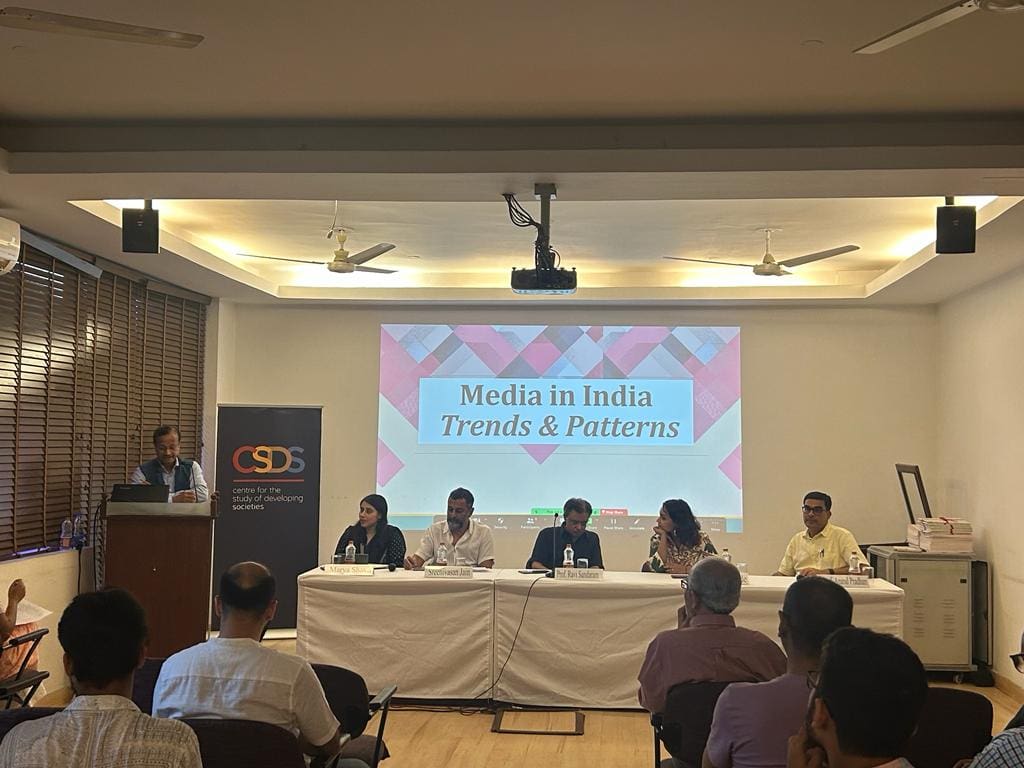
An overwhelming 80% of journalists in India feel that the media exhibits excessive favourability towards the Narendra Modi government, says a study published by Lokniti and the Centre for the Study of Developing Societies.
The report, “Indian Media: Trends and Patterns”, was published on Thursday. The comprehensive online survey included 206 journalists from diverse media outlets, encompassing television, print, and digital platforms.
Among the respondents, 41% were Hindi journalists, 32% worked in English, while the remaining 27% represented other regional languages. The study found that among the respondents, 64% were employed by media organisations, 27% were independent journalists, and 9% worked for both. The journalists surveyed were from across mediums – TV, print, and digital – and across states. Seventy-five percent of the participants were male. Gender aside, other variables among participants included language, age, level of seniority, and media associations.
Favourable towards Modi-led Bhartiya Janata Party
Regarding media coverage of Opposition parties, only 8% of journalists believed it to be too favourable, whereas a significant 61% stated that it was unfairly unfavourable.
The report maintained that three-fourths of journalists surveyed “agreed that there is favouritism towards one party” when it comes to the coverage. Eighty-two percent of independent journalists believed media organisations “favour a particular party.” By the particular party, they meant Bhartiya Janata Party accounting for 82 percent of journalists saying that.
Moreover, 73% of journalists observed a bias towards one political party within media houses. Among these, a vast majority of 82% perceived favouritism towards the Bharatiya Janata Party, while a mere 3% noted similar bias towards the Congress.
Interestingly, 86% of independent journalists expressed that the media portrayed the Modi government “too favourably,” while 81% of journalists working for news organizations shared the same viewpoint.
Approximately 72% of respondents feel that news most channels are currently experiencing limitations in performing their duties freely. For newspapers, this figure stands at 55%, and for digital media, it is 36%.
Biased towards Muslim community
The report substantiates that over half of the interviewed journalists by Lokniti stated that news media in India “unfairly targets the Muslim community.” 26 percent fully agreed with this statement, while an equal percentage of 26 percent fully disagreed.
Mental and physical health of journalists
According to the study, 7 out of 10 journalists said that their current job had a severe effect on their mental health.
Female journalists (85%) are more prone to mental health problems in comparison to male journalists (66%).
The report also pointed out that journalists working with English news organisations reported more poor physical health situation and their relationship with family is also affected.
Nearly three-fourths of the surveyed journalists reported facing some degree of impact on their physical health due to their job. Among them, 15% of respondents stated that their physical health was highly affected, 30% said it was moderately affected, and 28% indicated a slight impact.
Online harassment and abuse
As per the Lokniti-CSDS survey, respondents were asked about their experiences with online abuse, threats, harassment, bullying, or trolling related to their social media posts or comments. The results revealed that 64% of participants had encountered harassment at least once.
Study further highlights that digital journalists are particularly susceptible to online harassment, with 78% of them facing such incidents in the last year only.
Comparatively, 55% of TV journalists and 54% of print journalists reported similar experiences.
Among women respondents, more than half expressed feeling “extremely unsafe” regarding their privacy on Twitter and Facebook. Additionally, women felt less secure than their male counterparts while using WhatsApp.
The study was released today on July 27, Thursday at the seminar hall of the Centre for Studying of the Developing Societies in New Delhi followed by the panel discussion.
The discussion was chaired by Manisha Pande, Executive Director of Newslaundry, Marya Shakil, Senior Journalist, Prof. Anand Pradhan of Indian Institute of Mass Communication, Prof. Ravi Sundaram of Centre for the Study of the Developing Societies and Srinivasan Jain, Adjunct Faculty at O.P. Jindal Global University.



